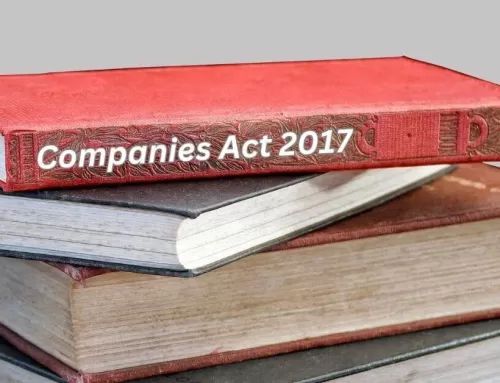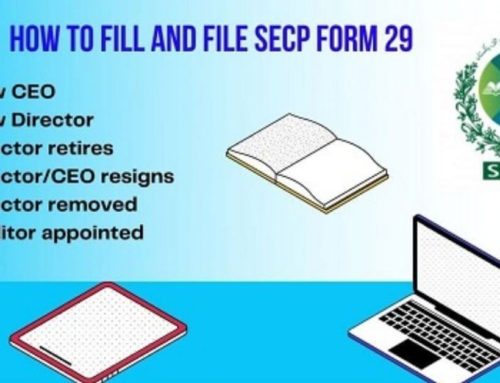What are the Post-Incorporation Steps for a Company in Pakistan?
A common question people ask after registration of a company is about the steps after incorporation of the company. They ask; “after company registration what next”? Since a company is a fictitious person and does not have a corpus of its own, it is managed by natural persons. For company management, there are certain post-incorporation procedures and requirements.
There are many steps after registration of the company and as a stakeholder, you must learn the procedural steps after incorporation of company. You may call it a post-incorporation setup of the company. Knowing these post-incorporation steps is very important for running your company in compliance with the law. Further, it will save you from any regulatory action by the Company Registrar.
Get CTC of Company Documents
The first step after incorporation of a company is to obtain digitally certified true copies (CTC) of the company documents. These include the Certificate of Incorporation, Memorandum of Association, Articles of Association, and Form-II.
You will need the CTC for opening a bank account in the name of your company. You can apply CTC from the services portal of SECP on payment of prescribed fees.
Open Bank Account of the Company
Open Bank Account of the Company
After getting the CTC you must contact a bank of your choice and open a bank account in the name of the company. All money transactions by the company must be done through this bank account.
For opening a bank account you will need a resolution by the Board of directors (the Board). The Board will pass this resolution in a duly convened meeting. Thereafter, the CEO or the Secretary, if any, will sign the extracts of the Board resolution printed on the letterhead. Thereafter, the CEO, Secretary, or directors will sign this document and certify it to be a true copy.
However, the whole set of requirements varies from bank to bank therefore, please check with the preferred bank for confirmation.
Deposit Subscription Money in the Bank Account
Deposit Subscription Money in the Bank Account
Once you have opened a company bank account, the signatories of the Memorandum and Articles will have to deposit the subscription money as mentioned against their names in the Memorandum and Articles.
Every subscriber will hold such a number of shares against this subscription money as agreed by them in the Memorandum. Please note that the amount of subscription money must the deposited as partial payment is not allowed under the law.
Appoint Auditor of the Company
Appoint Auditor of the Company
Another important action that the directors of the company have to take after incorporation is the appointment of an auditor for the company if required. The appointment must be made within 90 days of incorporation of the company. If you appoint an auditor, you will have to file Form 29 along with the consent letter from the auditor within 15 days of the appointment.
Prepare and Maintain Necessary Registers
Prepare and Maintain Necessary Registers
An important legal obligation that most companies fail to fulfill is the maintenance of certain registers. These include registers of members, registers of officers, and a register of contracts in which directors have interests.
Further, a company has to maintain a register of debenture holders and a register of charges/mortgages. The company must maintain and keep these registers at the registered office of the company. The stakeholders will have a right to inspect these registers, as per law.
In addition, you must maintain minutes books to record the proceedings of the meetings (in the form of minutes) of the Board of directors and general meetings.
Prepare and Maintain Books of Accounts
Prepare and Maintain Books of Accounts
Most importantly, a company has to maintain proper books of accounts including:
(a) receipts by and expense of the company and the matters in relation to which the receipts and expenditure take place;
(b) all sales and purchases of goods and services by the company;
(c) all assets and liabilities of the company; and
(d) items of cost in respect of production, processing, manufacturing, or mining activities.
Like the registers, the company must maintain and keep the books of accounts at its registered office. The books of account must give a true and fair view of the company affairs.
However, in the case of production, processing, manufacturing, or mining activities by the company, there are a few more requirements. The company must also maintain particulars of the utilization of material, labor, and other inputs or items of cost.
Period for which Accounts are to be Retained
Period for which Accounts are to be Retained
Most importantly, a company must maintain books of accounts, along with relevant vouchers, for Ten years, preceding the current year. However, if the company is in business for less than 10 years, it must keep the books for all preceding years.
Meetings of the Board of Directors
Meetings of the Board of Directors
As the management of a company is in the hands of the Board, they shall meet as and when required. However, a public company must have a Board meeting once a quarter. Every director is entitled to receive notice of all the meetings, under the law. It’s a good practice to send the agenda of the meeting to all directors enabling them to prepare for fruitful discussion.
Resolution by Circulation
Resolution by Circulation
In the event that the directors may not hold a meeting to conduct business, they may pass a resolution by circulation. A draft resolution containing all the relevant documents must be sent to every director who is entitled to receive notice of a meeting. Legally, a resolution signed by all the directors shall be as valid as a resolution passed in a meeting. However, a responsible officer of the company shall note this resolution in the next meeting, as a part of the minutes.
Conclusion
Conclusion
Now you know the important steps after incorporation of the company. You can proceed to start your business activities and continue to make your dreams come true. And if you follow these steps, you will be running your company without any regulatory action.
You are good to go if you continue with only the members who joined you at the time of registration of the company. However, if you want to issue further shares to existing members or bring in new shareholders, there may be some additional legal requirements. To learn more about the law related to companies, you may visit our site later, or contact us for your queries.





























Leave A Comment